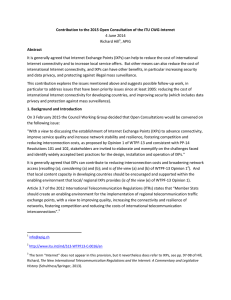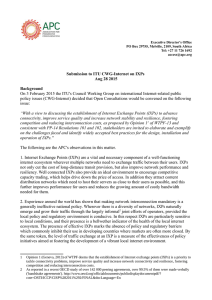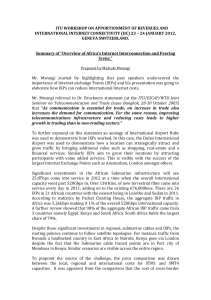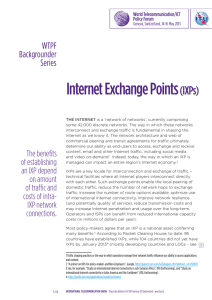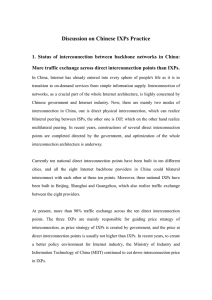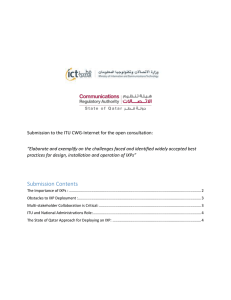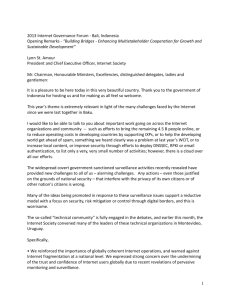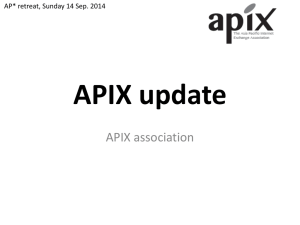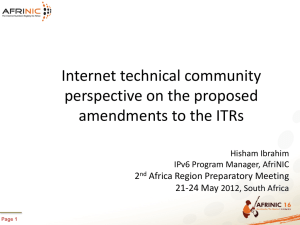Geneva, 14-16 May 2013
advertisement
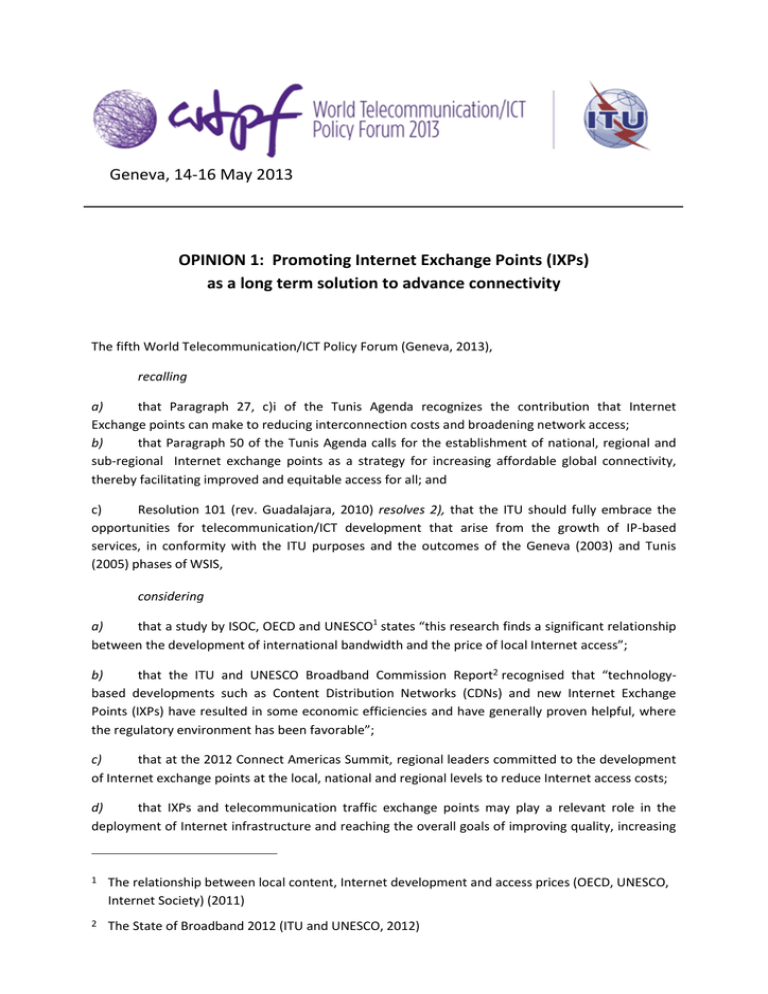
Geneva, 14-16 May 2013 OPINION 1: Promoting Internet Exchange Points (IXPs) as a long term solution to advance connectivity The fifth World Telecommunication/ICT Policy Forum (Geneva, 2013), recalling a) that Paragraph 27, c)i of the Tunis Agenda recognizes the contribution that Internet Exchange points can make to reducing interconnection costs and broadening network access; b) that Paragraph 50 of the Tunis Agenda calls for the establishment of national, regional and sub-regional Internet exchange points as a strategy for increasing affordable global connectivity, thereby facilitating improved and equitable access for all; and c) Resolution 101 (rev. Guadalajara, 2010) resolves 2), that the ITU should fully embrace the opportunities for telecommunication/ICT development that arise from the growth of IP-based services, in conformity with the ITU purposes and the outcomes of the Geneva (2003) and Tunis (2005) phases of WSIS, considering a) that a study by ISOC, OECD and UNESCO1 states “this research finds a significant relationship between the development of international bandwidth and the price of local Internet access”; b) that the ITU and UNESCO Broadband Commission Report2 recognised that “technologybased developments such as Content Distribution Networks (CDNs) and new Internet Exchange Points (IXPs) have resulted in some economic efficiencies and have generally proven helpful, where the regulatory environment has been favorable”; c) that at the 2012 Connect Americas Summit, regional leaders committed to the development of Internet exchange points at the local, national and regional levels to reduce Internet access costs; d) that IXPs and telecommunication traffic exchange points may play a relevant role in the deployment of Internet infrastructure and reaching the overall goals of improving quality, increasing 1 The relationship between local content, Internet development and access prices (OECD, UNESCO, Internet Society) (2011) 2 The State of Broadband 2012 (ITU and UNESCO, 2012) -2WTPF13/16(Rev.,1)-E the connectivity and resilience of networks, fostering competition and reducing the costs of interconnections, is of the view a) that establishment of local, national, sub-regional, and regional IXPs is a priority to address connectivity issues, improve quality of service and reduce interconnection costs; b) that enabling the interconnection of international, national and regional networks through IXPs may be an effective way to improve international internet connectivity and to reduce the costs of such connectivity, with regulation only when necessary to promote competition; c) that donor programmes and developmental financing mechanisms should consider the need to provide funding for initiatives that advance connectivity, IXPs and local content for developing countries; d) that the creation of IXPs enables a virtuous cycle: as the IXP attracts more ISPs, it will also begin to attract local, national and international content providers, along with business, academic, and governmental users, which in turn attracts more ISPs; e) that local content capacity in developing countries should be encouraged and supported within the enabling environment that local/ regional IXPs provides; f) that effective IXPs often emerge where Member States have adopted multistakeholder policy processes, as IXPs rely on cooperation among relevant stakeholders; g) that regulatory measures should not impede arrangements for transit and peering, to create an enabling and competitive environment for the creation of IXPs; h) that liberalization of the electronic communications market may play a significant role in allowing a competitive market to emerge to support introduction and interconnection with IXPs; and, i) that the increased level of interconnection enabled by participation in IXPs contributes to an enhanced level of resilience in the network infrastructure, invite Member States and Sector Members to work in a collaborative manner to: promote the further development and expansion of networks on national, sub-regional and regional levels; enable the emergence of Internet Exchange Points through, inter alia, the exchange of technical expertise and the fostering of supportive policy environments through open multistakeholder consultations; -3WTPF13/16(Rev.,1)-E promote public policies aimed at permitting the local, regional and international internet network operators to interconnect through IXPs. ____________________________
